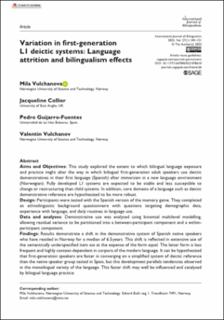Variation in first-generation L1 deictic systems: Language attrition and bilingualism effects
Peer reviewed, Journal article
Published version
Permanent lenke
https://hdl.handle.net/11250/3053116Utgivelsesdato
2022Metadata
Vis full innførselSamlinger
Originalversjon
10.1177/13670069221078610Sammendrag
Aims and Objectives:
This study explored the extent to which bilingual language exposure and practice might alter the way in which bilingual first-generation adult speakers use deictic demonstratives in their first language (Spanish) after immersion in a new language environment (Norwegian). Fully developed L1 systems are expected to be stable and less susceptible to change or restructuring than child systems. In addition, core domains of a language such as deictic demonstrative reference are hypothesized to be more robust.
Design:
Participants were tested with the Spanish version of the memory game. They completed an ethnolinguistic background questionnaire with questions targeting demographic data, experience with language, and daily routines in language use.
Data and analyses:
Demonstrative use was analysed using binomial multilevel modelling, allowing residual variance to be partitioned into a between-participant component and a within-participant component.
Findings:
Results demonstrate a shift in the demonstrative system of Spanish native speakers who have resided in Norway for a median of 6.5 years. This shift is reflected in extensive use of the semantically underspecified item ese at the expense of the form aquel. The latter form is less frequent and highly context-dependent in corpora of the modern language. It can be hypothesized that first-generation speakers are faster in converging on a simplified system of deictic reference than the native speaker group tested in Spain, but this development parallels tendencies observed in the monolingual variety of the language. This faster shift may well be influenced and catalysed by bilingual language practice.
Originality:
This article addresses a gap in research on deictic terms under conditions of language attrition. It documents a restructuring of the deictic system in first-generation speakers of Spanish residing in another country. The results suggest that marking peri-personal space is a core feature of deictic systems across languages, also preserved under deictic system shift.

